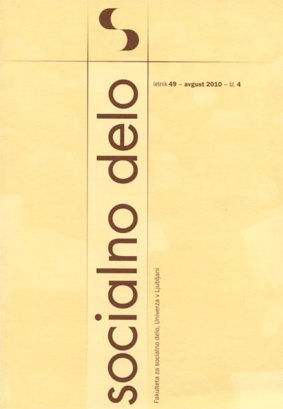
Revija Socialno delo
Socialno delo Journal is the only scientific periodical publication for social work in Slovenia. It's been published since 1961. From 2019, the journal adheres to open access format. Four issues are published per year: 1 (Jan-Mar), 2 (Apr-Jun), 3 (Jul-Sep), 4 (Oct-Dec). Abstracts are included in data bases: ERIH PLUS, International Bibliography of the Social Sciences IBSS), and EBSCO SocIndex with Full Text. The journal is published by Faculty of Social Work, University of Ljubljana. Journal is so-financed by Slovenian Research Agency (ARRS). Texts published in Socialno delo Journal are licenced under Creative Commons licence: CC BY-SA
ISSN 0352-7956
year 64, No.3
SCIENTIFIC ARTICLES
Srečo Dragoš
Blind spots of the welfare state - Pg. 197 - 218Keywords: social policy, prejudice, neoliberalism, fascism, authoritarian personalityWith the metaphor used in the title, the reference is to social characteristics or facts (as Durkheim would say) that we ignore or underestimate despite their existence, whether due to ideological reasons, historical amnesia, or flawed developmental patterns. In relation to the uncertainty of the welfare state – the most important social science innovation of the 20th century – several such “blind spots” have accumulated in Slovenia's development. In addition to those listed in the introduction of this text, the following contribution focuses on the three most significant ones: prejudice, costs, and values. In Slovenia, prejudice against the welfare state and its users has intensified to such an extent that, in terms of its expression, we exceed both the European average and the average of former socialist countries, despite the latter being higher than the EU average. The second “blind spot,” which poses a danger to the future of the welfare state, is its expenditure, where we stand out within the EU in an anorexic direction. Since independence, we have been significantly underfunded in terms of total state expenditure and within its individual sectors, as we have never set a goal to rise (at least) to the EU average. The third danger concerns a set of values that the authors of the Frankfurt School identified as components of the authoritarian personality. In these, too, we are markedly above the European average.
Vesna Leskošek
Conceptual changes in decision-making about child protection and upbringing, and about contacts in cases of violence - Pg. 219 - 239Keywords: Family Code, parental alienation, child’s interest, coercive control, gender stereotypes, children\'s rightsThe main topic of the paper is the changes to the Family Code in the section dealing with divorce, custody and visitation right. The changes reflect a transformed understanding of the relationship between the partners and the relationship with the children, which on the surface represents progress towards a more equal position of men and women in divorce and custody proceedings, but an analysis of the commentaries on the Family Code shows that the practices are conservatively patriarchal and based on the belief that women are primarily responsible for the children's good relationship with the noncustodial parent, i.e. mainly the father. An analysis of the texts of court decisions since the Family Code came into force shows that the changes follow the concept of parental alienation, which is also used in cases where the divorce was a result of gender-based violence and which allows for the continuation of violent control after the divorce. The article concludes with a list of the main international instruments that this jurisprudence violates, including the Istanbul Convention, which Slovenia ratified in 2014.
Marino Kačič
The quiet power of informal rules and support in institutions for people with disabilities in Slovenia - Pg. 241 - 255Keywords: empowerment, handicap, user\'s experience, discrimination, social inclusionThe paper analyzes the role of formal and informal rules and practices within institutions serving people with disabilities, focusing on their impact on users’ autonomy, inclusion, and personal development. The study examines both supportive practices and those that restrict individual agency, revealing how institutional structures shape lived experiences. Based on a qualitative analysis of ten in-depth interviews and the author’s autoethnographic reflections, the research highlights the complexity of interactions between formal and informal institutional mechanisms. It emphasizes the quiet power of informal supportive practices, which often function as compensatory mechanisms for the rigidity of formal rules. These practices foster flexibility, cooperation, and individuality, enhancing user experience and promoting autonomy. Building on these findings, the Model of Institutional Influence on User Development and Independence offers an analytical framework for understanding such processes. The results provide valuable insights for social workers and psychosocial counselors in developing more adaptable, inclusive practices that bridge formal institutional gaps.
